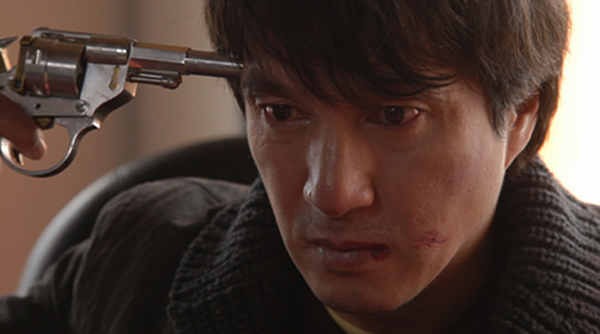by Dariel Figueroa

I was warned twice before the first flashes of projector light pushed the images onto the screen inside one of the two theaters situated inside the Roxy movie house. The first time occurred when I interviewed the Philadelphia Film Society’s executive director, Andrew Greenblatt, earlier that week.
“God…(the film) Moebius is…it’s something to be seen. It’s very graphic and very difficult…and I don’t think there’s one word spoken in the film.”
The gauntlet had been thrown.
I had grown weary of the standard Hollywood movie long ago. It had become a dull, jaded blade that I no longer wished to spar with; the aversion helped push me towards more outlandish and unconventional fare. I began absorbing the works of Takashi Miike, Luis Buñuel, David Lynch, and the entire Dogme 95 revolution—anything beating an effervescent pulse that deviated from the norm was game.
When I was tasked to attend the Spring Showcase held by the Philadelphia Film Society, a community of film purists and experimentalists, I knew I had the opportunity to screen something less evocative of the mainstream offerings vacuuming up dead presidents at the local multiplex. Then Andrew Greenblatt mentioned Moebius, the Philadelphia Film Society’s first entry in their midnight movie series. I was intrigued.
“We wanted (the Spring Showcase) to be reflective of the Philadelphia Film Festival. We have an incredibly diverse slate, so it means that there are films for everyone. Hopefully people will take risks outside their comfort zone,” Greenblatt said. “The Graveyard Shift, the midnight stuff, that’s crazy stuff, but it’s fantastic!”
The midnight movie has roots tracing back to the 1970’s, when films like John Waters’ Pink Flamingos and Alejandro Jodorowsky’s El Topo rocked audiences by eschewing conventional storytelling elements for visceral, staggering cinematic machinations. Those days have long passed, though—contemporary films get nary a screening should they not exemplify a balloon-budgeted remake or sequel.
 With the advent of streaming services like Netflix and the collapse of the mom and pop video store, it’s become an exercise in futility should you have a taste for something that doesn’t have Michael Bay attached to it. The Spring Showcase, an extension of the Philadelphia Film Festival, scheduled solely inside the society’s new home of operations, the Roxy, offered reprieve.
With the advent of streaming services like Netflix and the collapse of the mom and pop video store, it’s become an exercise in futility should you have a taste for something that doesn’t have Michael Bay attached to it. The Spring Showcase, an extension of the Philadelphia Film Festival, scheduled solely inside the society’s new home of operations, the Roxy, offered reprieve.
“We go around the festival circuit and we see these films that we love and we really want to give attention to them, to give them a spotlight,” Greenblatt said. “We’re doing everything at our new theatre, the Roxy. We’re really proud of the place and we’ve been open a little over four months. We want to make sure people come see it, and see all the hard work we’ve done and really enjoy it, and hopefully people will come back.”
When I took my seat in the narrow, yet comfortable corridor of seats at one of the two screens inside the Roxy, a feeling of unease began to set in. I hadn’t read much into that night’s offering, a film by Korean auteur Ki-duk Kim named Moebius, a film so hardcore it was banned in Korea; but, I knew enough to have a free hand ready to dash its way up towards my line of sight so as not to disturb the contents of my stomach. That’s when the second warning happened.
“Welcome to the Spring Showcase,” said a bearded man, situated between the screen and the corridor of seating. He introduced himself as Michael Lerman, the man responsible for programming the festival. Next to him stood a petite woman with glasses and a clipboard. At the next announcement she grimaced like Vincent Price, one hand on the lever to unleash the pendulum. “In the seven or eight years since I’ve been programming films here, this is the most extreme film we’ve ever shown.”
I was ready. I could feel the click-clacking of the coaster caboose ratcheting up the hill for the eventual decent into cinematic madness. The ferocious Korean film did not disappoint.
There was castration; the masticating of severed appendages; Oedipal stratagems; brutal mutilation as sexual proxy. In other words, it was awesome.
Of course, while the film was indicative of the kind of programming one can expect from the Philadelphia Film Society’s Graveyard Shift offerings, it certainly was not for everyone.
When I approached Lerman after the showing, I divulged my date’s unenthusiastic disposition towards Ki-duk Kim’s particular brand of deviance.
“I think it’s safe to say she was disturbed,” I said.
A gleam appeared in Lerman’s eye. A fiendish grin split across his face: “She should be.”


 Gaming7 years ago
Gaming7 years ago
 Music7 years ago
Music7 years ago
 Business7 years ago
Business7 years ago
 The Jawn7 years ago
The Jawn7 years ago
 The Jawn7 years ago
The Jawn7 years ago
 The MC7 years ago
The MC7 years ago
 Entertainment7 years ago
Entertainment7 years ago
 The Jawn7 years ago
The Jawn7 years ago

 With the advent of streaming services like Netflix and the collapse of the mom and pop video store, it’s become an exercise in futility should you have a taste for something that doesn’t have Michael Bay attached to it. The Spring Showcase, an extension of the Philadelphia Film Festival, scheduled solely inside the society’s new home of operations, the Roxy, offered reprieve.
With the advent of streaming services like Netflix and the collapse of the mom and pop video store, it’s become an exercise in futility should you have a taste for something that doesn’t have Michael Bay attached to it. The Spring Showcase, an extension of the Philadelphia Film Festival, scheduled solely inside the society’s new home of operations, the Roxy, offered reprieve.



You must be logged in to post a comment Login